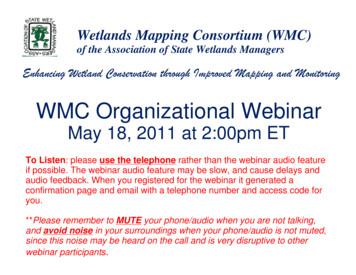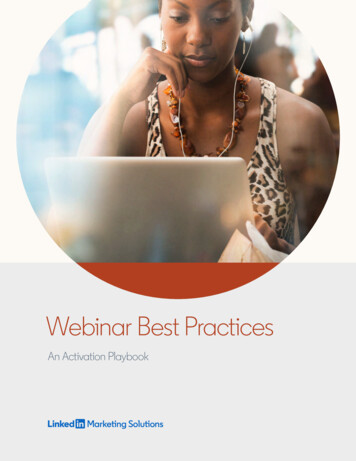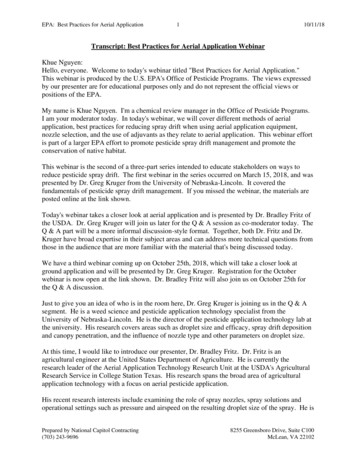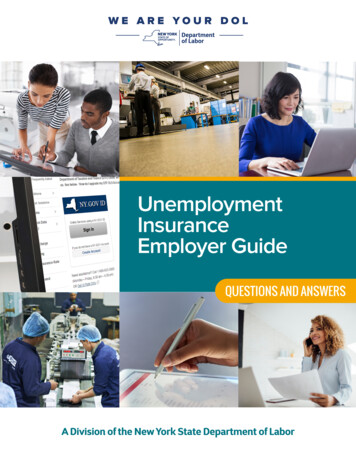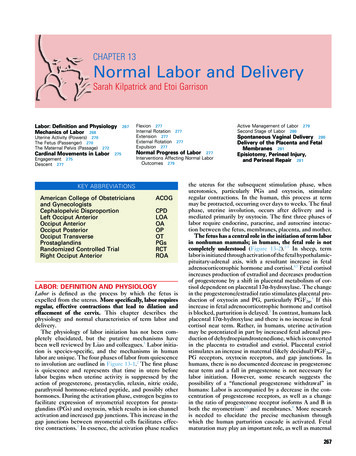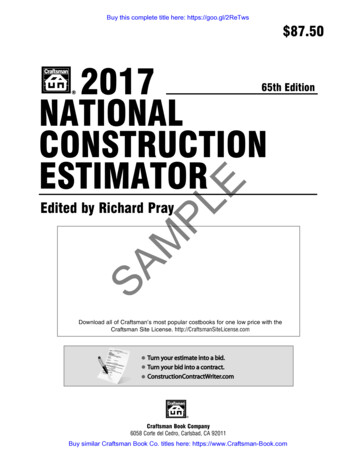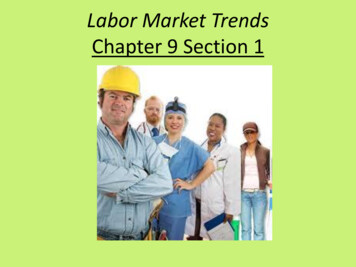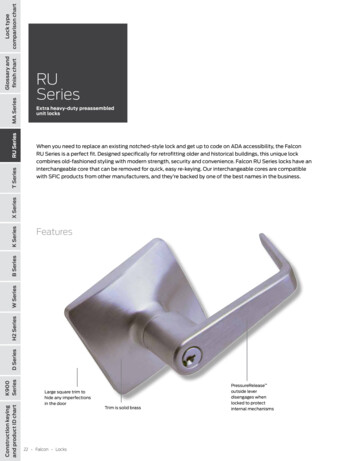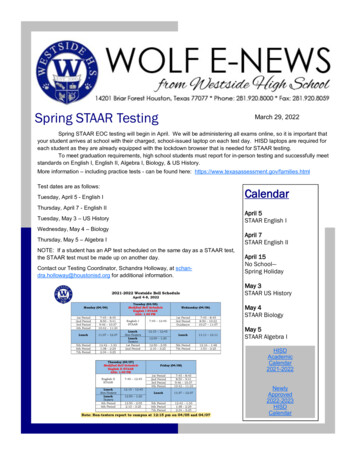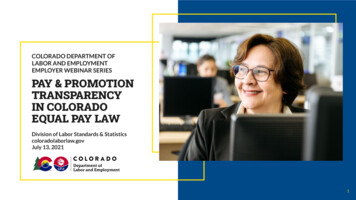
Transcription
COLORADO DEPARTMENT OFLABOR AND EMPLOYMENTEMPLOYER WEBINAR SERIESPAY & PROMOTIONTRANSPARENCYIN COLORADOEQUAL PAY LAWDivision of Labor Standards & Statisticscoloradolaborlaw.govJuly 13, 20211
Next webinar topic:How to Save Money on Your Workers’Compensation Insurance and PromoteWorkplace SafetyCDLE EmployerWebinar Series Join PCC staff on Wednesday, August 25th at2:00pm for an employer-centric webinar tolearn more about how to become certifiedwith the PCC Program and save on yourpremiums. Invite link in follow up email.Previous webinars available on CDLE’sYouTube Channel Unemployment Insurance ChargingStatements, Premiums, Trust FundPaid Sick LeaveUnemployment Insurance FraudWorkers Compensation in Covid-192
Creating “A working economy thatelevates all of Colorado” by: ABOUT CDLE Building Colorado’s talent pipelineEnsuring fair labor practicesMaking investments in human capital andstrategic workforce developmentHelping businesses recruit employeesPresenting an up-to-date and accuratepicture of the economyProtecting our communities with a varietyof consumer protection and safetyprogramsEnsuring benefits to injured workersContributing to a stable economy byproviding temporary wage replacementHelping individuals with disabilities obtain,maintain, or regain employment3
Incentives and Compliance Assistance Employer Incentivesand ComplianceAssistance Workers’ Comp Premium Cost ContainmentProgramPublic Safety ProgramsUnemployment Insurance ComplianceAssistance SeminarsVoc Rehab Disability Etiquette andWorkplace AccommodationsWage and Hour guidanceEmployer Recognition Programs Governor’s Summer Job HuntShining Stars of VRWorkplace Safety Awards4
PAY & PROMOTION TRANSPARENCYIN COLORADO EQUAL PAY LAW The Equal Pay for EqualWork Act, Part 2(passed by legislature asHB 19-085; now in Coloradostatutes as CRS 8-5-201 et seq.) The Equal Pay TransparencyRules (7 CCR 1103-13) CDLE Resources &Compliance Guidance,at ColoradoLaborLaw.gov 5
Equal Pay for Equal Work Act(SB 19-085), Effective 1/1/21 (the “Act”)Resources: https://cdle.colorado.gov/equalpaytransparency(or: on the bottom of ColoradoLaborLaw.gov, click the box,“Pay/Promotion Transparency per Equal Pay Act”) The Text of the Statute and Rules(Equal Pay for Equal Work Act, HB 19-085, C.R.S. § 8-5-101 et seq.)(Equal Pay Transparency Rules, 7 CCR 1103-13) Extensive Compliance Guidance: Detailed Summary of Statute Rules, with Guidance on Interpreting& Applying: Interpretive Notice & Formal Opinion (INFO) #9: EqualPay for Equal Work Act, Part 2: Pay and Promotion Transparency Summary Fact Sheet Contact information, to call or email the Division w/ questions Complaint form for Equal Pay for Equal Work Act complaints6
Equal Pay for Equal Work Act(SB 19-085), Effective 1/1/21 (the “Act”)Who is covered? Employer, C.R.S. 8-5-101(5): “the state or any political subdivision,commission, department, institution, or school district thereof, andevery other person employing a person in the state.” Applies to any person or entity employing 1 employees in ColoradoIncludes state and local governments, non-profits, & individualsExclude federal governmentNot limited by # of employeesEmployee, C.R.S. 8-5-101(4): “a person employed by an employer.”7
Equal Pay for Equal Work ActWage Discrimination Ban Part 1“Wage discrimination prohibited” (C.R.S. 8-5-102) Pay discrimination: prohibits “paying an employee of one sex less forsubstantially similar work, regardless of job title, based on skill; effort ;and responsibility,” and “wage rate differential” can be based only on:1. systems based on seniority, merit, production quality or quantity2. geographic location3. education, training, or experience, if reasonably related to the work4. travel, if regular and necessary for the work Wage history requirements can’t seek or rely on employee’s wage history to set their wage[redressing “baked in” pay disparities that can follow women across jobs] can’t ban employees from disclosing/discussing their wages [alreadycovered by 2008 Wage Transparency Act]8
Equal Pay for Equal Work ActWage Discrimination Ban Part 1 Not administered by our Division (C.R.S. 8-5-103(1)) Division may create program “to accept and mediate complaints and toprovide legal resources concerning alleged violations of” Part 1. Not yet; Division has focused on Colorado employers’ & employees’ needto facilitate compliance with Part 2 (pay & promotion transparency), whichthe Division must administer Remedies (C.R.S. 8-5-103):1.lawsuit with no administrative exhaustion (i.e., may go straight tocourt without any administrative complaint);2.CCRD charge under Colorado Antidiscrimination Act (rightsexisting before the Act)9
Equal Pay for Equal Work ActPay & Promotion/Advancement Transparency Part 210
Equal Pay for Equal Work ActPart&2:Promotion/AdvancementPayPay & Promotion/AdvancementTransparencyTransparency Part 211
Equal Pay for Equal Work ActPay & Promotion/Advancement Transparency Part 2Left to Rulemaking and Division Interpretation:(A)Pay Transparency in Job Postings:(1)(2)(3)(B)Promotion/Advancement Transparency:(1)(2)(3)(C)Is Posting Required?“Range”: Width? Binding?“Benefits”: Which?For Only Those Qualified?Contents and Permitted Methods of Notice?Requirements for Accepting Applications or Hiring?Both Pay & Promotion/Advancement: Jobs & Postings Outside CO?Rules:Equal Pay Transparency Rules (“EPT Rules”), 7 CCR 1103-13Interpretive Guidance:INFO #9, Equal Pay for Equal Work Act, Part 2: Pay and Promotion Transparency12
Equal Pay for Equal Work ActPart&2:Promotion/AdvancementPay & Promotion/AdvancementTransparencyPayTransparency Part 2(A)Pay Transparency in Job Postings, 8-5-201(2):(1) Is an external posting required? INFO #9 p. 2No. Compensation disclosure required only if employer chooses to have an external job post.(2) “Benefits”: Which? EPT R. 4.1.1(C): major benefits; others if tax-reported(3) Compensation “Range”: (a) Width? (b) Binding? EPT R. 4.1.213
Equal Pay for Equal Work ActPart&2:Promotion/AdvancementPay & Promotion/AdvancementTransparencyPayTransparency Part 2(A)Pay Transparency in Job Postings, 8-5-201(2) (cont’d)(4) Range: Job-specific? EPT R. 4.1.2, INFO #9 Must be for particular job advertised, not all in a department or category, .e.g.:(5) Range: Geographic location? Only Colorado range is required for multi-state or remote postings.Limit by location: postings may specify a different range for different parts of Colorado.(6) Hyperlinks or URL to Compensation and Benefit Information? INFO #9 p. 2 Electronic postings can use clearly-identified hyperlink or URL to comp. & benefits(7) Employer Identity? Not required Anonymous job postings are fine as long as they include job title, compensation & benefits14
Equal Pay for Equal Work ActPart&2:Promotion/AdvancementPay & Promotion/AdvancementTransparencyPayTransparency Part 2(A) Pay Transparency in Job Postings, 8-5-201(2) (cont’d):When is Posting Compensation Required? Based on Job & Employer Location:(A) Employer with Colo.staff at time of post(B) Employer with no Colo.staff at time of post(1) Job tied to location in CO(2) Remote job, even if“anywhere but CO”Must post comp.Need not post comp.Must post comp.Need not post comp.(3) Tied to location out of CONeed not post comp.Need not post comp.Omitting compensation by posting that a remote job is for anyone, anywhere,“except Coloradans”: Not compliant with Act.(a)No exception, Act text:All employers w/ any CO staff“shall disclose compensation in each posting for each job.”(b)Rules can’t & don’t add exceptions absent from the statute.Implied exception: Truly must be done out-of-st (waiter), arguably beyond Act reach.(c)Posting job as “remote”: Statement that it’s performable anywhere, including CO.Can’t mis-label job (as not performable in CO) to opt out of law.15
Equal Pay for Equal Work ActPart&2:Promotion/AdvancementPay & Promotion/AdvancementTransparencyPayTransparency Part 2(A) Pay Transparency in Job Postings, 8-5-201(2) (cont’d):When is Posting Compensation Required? Based on Job & Employer Location:Example: Danny Denver’s Daiquiris is a sports bar with locations in Coloradoand several other states. It is covered by the Act because it has Coloradoemployees. It posts several positions:(1) Waiter in one of its Montana restaurantsNeed not post comp.(job cannot beperformed in CO)(2) “Remote” tech support position that must provideoccasional support at the Bozeman, MT headquartersNeed not post comp.(“remote” job cannotbe performed in CO)(3) “Remote” tech support position that must provideoccasional support at the Boulder, CO headquartersMust post comp.(“remote” job tied toCO location)Must post comp.(remote job can bedone anywhere,including CO)(4) Completely remote billing administrator; job post statescan be performed “anywhere except Colorado”16
Equal Pay for Equal Work ActPart&2:Promotion/AdvancementPay & Promotion/AdvancementTransparencyPayTransparency Part 2(B)Promotion/Advancement Transparency, 201(1):(1) Only Those “Qualified”? No - statute: “all current employees,” clear legislative intent(2) What Are “Opportunities for Promotion”? (EPT R. 4.2.1; INFO #9 p. 2-3)- an existing or new position the employer intends to fill- “new” position created by changing title, authority, duties, or opportunities- but not by changing pay or adding degree or certification (e.g., “CPA” or “LCSW”)- “promotion” in terms of compensation, benefits, status, duties, or opportunities- matters whether it would be a promotion for any employee, not whether it is apromotion/demotion/lateral move for a specific employee expected to fill position17
Equal Pay for Equal Work ActPart&2:Promotion/AdvancementPay & Promotion/AdvancementTransparencyPayTransparency Part 2(B)Promotion/Advancement Transparency, 201(1) (cont’d)(3) Contents (EPT Rule 4.2.2):- job title- means by which employees may apply- compensation and benefits as required by section 201(2)- may include required qualifications and intended hire/promoteeSimple compliant example: “Jo Doe is recommended for promotion to senior accountant.Salary 50-70,000; health insurance & 401k. Interested applicants contact S. Poe in HR.”(4) Permitted Methods? (EPT Rule 4.2.3): Any, as long as all covered employees(A) can access within their regular workplace, either online or in hard copy;(B) are told where to find required postings or announcements; and(C) if a method reaches some but not all (e.g., online), use alternative for such EEs.(5) Special Method for Regular/Automatic Promotions or Hiring (INFO #9 at 4):Regular (at least monthly) hiring or automatic promotion into specific position uponcompletion of set requirements: one-time notice of the promotional opportunityin handbook, etc.18
Equal Pay for Equal Work ActPart&2:Promotion/AdvancementPay & Promotion/AdvancementTransparencyPayTransparency Part 2(B)Promotion/Advancement Transparency, 201(1) (cont’d(6) Exceptions (EPT Rule 4.2.5):(A) confidentiality from incumbent being replaced, as necessary & consistent(B) automatic promotion after trial period of up to a year(C) temporary/acting/interim hire up to 6mn; post when/if may become permanent(7) Requirements for Receiving Applications or Hiring? EPT Rule 4.2 and INFO #9:No restrictions on hiring process or who is hired, including- can already know who position is intended for (but not final choice)- may state that applications are open only those with certain qualifications- may screen or reject candidates based on qualifications- no set # of days before hiring decision- no requirement that employer receives/considers applications19
Equal Pay for Equal Work ActPart&2:Promotion/AdvancementPay & Promotion/AdvancementTransparencyPayTransparency Part 2(B)Promotion/Advancement Transparency, 201(1) (cont’d)(8) Out-of-State Jobs and Employees (EPT Rule 4.3 and INFO #9)When is Promotion Notice Required? Based on Job & Employer Location:(A) Employerwith Colo. staff(B) Employerwith no Colo. staff(1) Job tied to location in CONotice w/ comp. requiredNotice not required(2) Remote jobNotice w/ comp. requiredNotice not requiredNotice requiredComp. not requiredNotice not required(3) Tied to location out of CO20
Equal Pay for Equal Work ActEnforcement and ComplianceEmployers are overwhelmingly complying, at an increasing rate:(1) Division study of compliance by Colorado’s 51 largest employers: analysis ongoing tentative: 1st 6 months, pay-posting compliance has risen to 80-90% of posts Colorado’s largest, most successful employers are complying, by posting comp.(2) Division study of remote job postings, after news reports of posts excluding CO Division randomly sampled 200 Indeed.com remote job posts, by CO & non-COemployers: 99% of remote job posts did not exclude Coloradans(3) Division review of compliance after violations found: Division must investigate all complaints alleging violations Of violations found: 100% of employers have fixed non-compliant postings Employer brings posts into compliance after 1st violation Division waives all finesKey Goal: Further Colorado’s strong progress toward posting compliance, not fines More outreach education coming for employers w/ non-compliant.posts, or Qs21
Q&AQuestion: We don't have job titles or salary ranges. How does this affect our company?Answer:Pay Transparency: The Act does not require an external job posting before hiring, soemployers may, e.g., solicit resumes or hire through talent scouts without creating ajob posting that would require disclosing compensation. If an employer does create ajob posting, it need not have a job title, but must disclose the compensation theemployer reasonably believes it will offer for the position it is seeking to fill.Promotion Transparency: If an employer does not have job titles, it may use adescription of the open position, rather than job title, when providing notice ofpromotional opportunities to current employees. Notice must also includecompensation and benefits.See: slides 13-14, 18; EPT Rule 4.1-4.2; & INFO #9 p. 1-3.22
Q&AQuestion: We host a job board available for members and non-members to post their firms'openings. As we understand: The mandate for providing salary information in job postingsis for employers, however, our organization could remind employers of the Colorado EqualPay Act requirements? Can you confirm our responsibilities as the hosting organization, andfurther clarify the liabilities to users of our site? Can employers be in violation if they post toour website and do not include information as required by law?.Answer: Per INFO #9 at p. 1, “[e]ntities merely sharing or re-posting the jobs of otheremployers — a business operating a website that posts jobs from employers, or agovernment or non-profit agency that connects job-seekers with jobs, etc. — are notliable for non-compliant postings under Part 2 or the EPT Rules.” An entity hostingemployer job postings may notify posting employers of the Act’s requirements, but it isnot required to do so. An employer violates the Act if it causes a non-compliant postingto be displayed on a third-party website (including the job board described in thisquestion, Indeed.com, or Connecting Colorado), but the website owner does notviolate the Act by displaying the posting.See: INFO #9 p. 1.23
Q&AQuestion: I inadvertently used an employment application that has salary history from theapplicant. after the January 1 new law. I have since then updated our CO application todoes not ask for pay/salary history. What do in the case where the applicant disclosed theirrate of pay?Answer: The Act states, "[a]n employer shall not: (a) Seek the wage rate history of aprospective employee or rely on the wage rate history of a prospective employee todetermine a wage rate." C.R.S. 8-5-102(2) (emphasis added). This would seem to allowan employer to solicit salary history information if the information was not used todetermine a wage rate and applicants were not penalized for failing to disclose a wagerate. However, the Division does not enforce this portion of the Act (Part 1), and theDivision's interpretation may not be in line with how courts will interpret thisprovision.See: slides 8-9.24
Q&AQuestion: Do we have to post the wage externally, internally or both?Can we use a pay scale such as P1, P2, P3 and have the scale available upon request and notpost the actual wage?Answer: Employers do not have to create external job postings, but if they choose todo so the posting must include compensation and benefits information. Employersmust provide internal notices of promotional opportunities, and those notices mustinclude compensation and benefits.Employers may hyperlink or provide a URL linking compensation and benefitinformation in online postings, including in notices of promotional opportunity thatmust be accessed online (e.g. via email or online job board). Employers may not requireadditional steps — such as sending an email or calling a phone line — to requestcompensation information.See: slide 13-14, 18; EPT Rule 4.2.2; & INFO #9 p. 2.25
Q&AQuestion: Isn’t there a lawsuit about whether this law is unconstitutional, and is enforcementbeing held off until the case is decided?Answer: Yes, such a lawsuit was filed in late December 2020, but: in late May 2021, the federal court rejected the request to issue a preliminaryinjunction (an order early in the case) to halt application or enforcement based on thelawsuit’s claim that both the statute and the Division’s rules were unconstitutional;and in July 2021, all parties agreed to a dismissal of the lawsuit.26
Q&AQuestion: As an employer who has employees in 22 states, does this require us to listsalaries on all postings for jobs in states that are not in CO?See slides 15-16.Question: Are we required to post salaries for jobs that are remote (i.e. the main office is inIowa, but we may consider an applicant from CO)?See slides 15-16.Question: Is there an employee number threshold below which the company becomesexempt from the requirements of this law?See slide 7.Question: So many employers are not listing the salary range in their job postings. What arethe repercussions? Who calls them out? How do job seekers notify them? How is the statesupporting this challenge and helping both job seekers and employers respect the law?See slides 5-6 (complaint form) and 21 (compliance and education efforts).27
Thank You!Division of Labor Standards and Statisticscoloradolaborlaw.gov303-318-8441cdle labor standards@state.co.us28
When is Posting Compensation Required? Based on Job & Employer Location: (A) Employer with Colo. staff at time of post (B) Employer with no Colo. staff at time of post (1) Job tied to location in CO Must post comp. Need not post comp. (2) Remote job, even if "anywhere but CO" Must post comp. Need not post comp.
